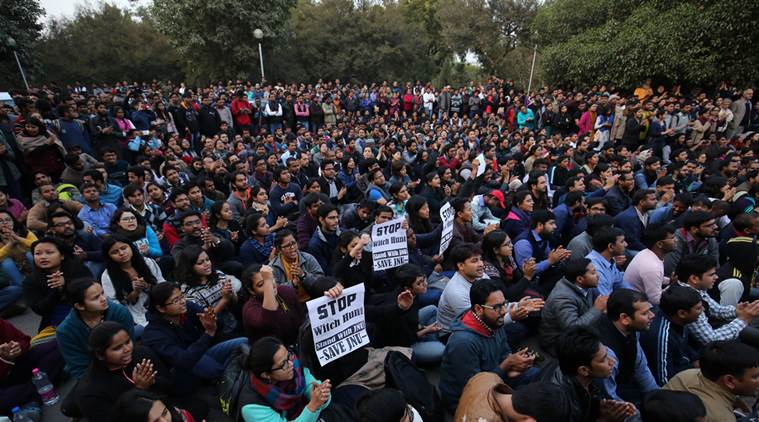The Islamophobia of the Left: Why the politics of Muslim solidarity is important

 By Waseem RS for TwoCircles.net
At the JNU Campus, there is an unwritten law imposed by the 'paternalist Indian left' in relation to Muslims. It is the argument that the solidarity from the Muslim student organizations must be rejected because of the reason they are not Dalits, nor feminists, nor leftists. There is no such thing as Muslims student politics in the leftist imagination. You cannot speak as a Muslim. You can only speak as a Muslim woman or lower caste Muslim. The moment you utter the word Islam or Muslim, you are finished.
By Waseem RS for TwoCircles.net
At the JNU Campus, there is an unwritten law imposed by the 'paternalist Indian left' in relation to Muslims. It is the argument that the solidarity from the Muslim student organizations must be rejected because of the reason they are not Dalits, nor feminists, nor leftists. There is no such thing as Muslims student politics in the leftist imagination. You cannot speak as a Muslim. You can only speak as a Muslim woman or lower caste Muslim. The moment you utter the word Islam or Muslim, you are finished.
This is indeed a new argument for the left politics. They are suffering from short term memory loss in terms of the political history of the JNU campus. There are many instances where Muslim student and political movements supported the left in campus politics or in the general election. At that time, there was no worry about the impurity of the Muslim solidarity politics. AISA and SFI were the benefactors of the Muslim vote bank for decades in the JNU union elections.
The emergence of the autonomous student politics in the JNU campus is a recent development. The critical language of caste, gender, community, and religion made possible a new imagination around the autonomy of the oppressed. The radical democratic political vision developed by oppressed unity is non- hierarchical, plural and inclusive. It rejects the top-down approach of the leftist parties and the brahminical vanguardism of the left leaders.
After the development of the idea of oppressed unity and after the rise of BAPSA as an electoral force, there is a break in the radical consensus at JNU campus. One of the consensuses was that the only role assigned to Muslims in JNU is to vote for the left and live in a self-isolated space without organising politically. It was the same project that RSS assigned to Muslims. You live the life of a 'good Muslim' as long you don’t interact and act together with other oppressed communities. Similarly, the paternalist Indian left seems to suggest that Muslims should isolate from the rest of the JNU students and stop supporting social movements fighting for justice. This argument comes precisely at the moment Muslims reject the rhetoric of the left and join with other oppressed peoples for the sake of acting together against injustice and violence that is experienced by non-Muslims as well as Muslims.
Muslim student movements believe that as Muslims we must build solidarity with people from other faiths, social visions and ideologies as long there is no paternalism involved in the process. Muslims should develop a solidarity politics not by erasing the difference of the other oppressed groups, but by respecting difference while remaining Muslims in the act of developing a complex yet firm solidarity.
As Muslims, we foreground the ethical and political principles of Islam in order to understand the issues of society and politics. It is Islam that makes us stand for social justice in the Indian context. We respect those who opt out for other solutions to the issues of marginality - those who are keen to develop the conversation away from the paternal Indian left – yet, that does not mean we will accept the uncritical imposition of categories on our approach – whether it is the class, gender, caste, religion etc.- without developing an understanding of the role Islam plays in determining our political categories.
It is important to stress the difference of Islam in the context of the unacknowledged privilege that Hinduism enjoys in the Indian imagination, and that informs most of the alternative politics that we are familiar with the JNU campus. Just think for a moment about the Holi celebration, the food culture, the dress codes or the academic ceremonies in the JNU! They are Brahmins inside and out. For that simple yet profound reason, simply being a Muslim in India is a disturbance to the social fabric of imagined nationalist unity – whether leftist or rightist.
As Muslims, we refuse to live in the cocoon assigned to us by the left. As Muslims, we refuse the isolationist politics of the left. As Muslims, we are not safe as long other oppressed communities are not safe. We are aware that the problem faced by the Indian society cannot be solved by one party or faith in isolation. There is a need of the coming together of the marginalized peoples in a horizontal and non-hierarchical manner so as to challenge the existing form of political hegemony and social domination. Jai Bhim! Jai Meem! The author is currently pursuing his Phd in Centre for Law and Governance, Jawaharlal Nehru University (JNU) New Delhi Related:
How the Indian ‘Left’ is using Islamophobia: Lessons from JNU student union elections
